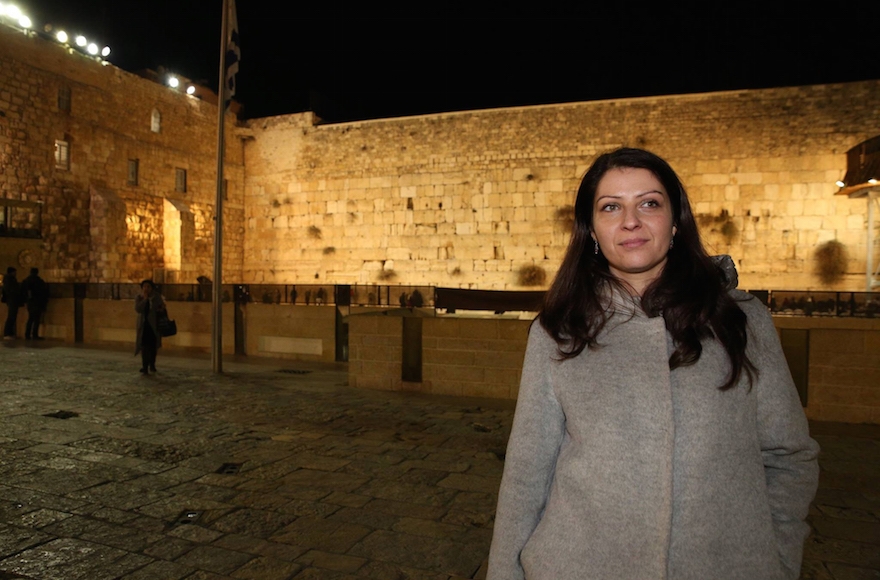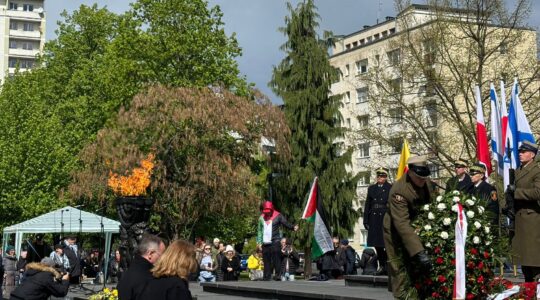VIENNA (JTA) — Most pro-Palestinian activists don’t begin interviews about Israel by calling it “a startup miracle.”
But then Muna Duzdar, president of the Austrian Palestinian Association, isn’t like most pro-Palestinian activists.
For one thing Duzdar, 38, a lawyer born in this capital city to Palestinian parents, is the first Muslim woman to serve as an Austrian state secretary — a position, equivalent to deputy foreign minister, to which she was appointed last year.
For another, even some of Duzdar’s pro-Israel counterparts describe her as a moderate with a long and unblemished record of facilitating dialogue and rejecting hate.
This goes a long way in explaining why Duzdar praised Israel as a “miracle of startups that Austria can learn a lot from” during a recent interview with JTA about her first state visit to the Jewish state earlier this month.
Duzdar, who is responsible for diversity, public services and digitization, met in Israel with veterans of the Israel Defense Forces’ 8200 signal intelligence unit, whom she learned is using its knowledge to make “a serious contribution to medicine and social issues.”
She keeps in her office a copy of the 2009 book “Start-up Nation” by Dan Senor and Saul Singer, which she read ahead of her trip to the Palestinian territories and Israel. During the trip, she focused on learning from the Israeli experience in order to encourage innovation in Austria.
“I think a lot of it comes down to not fearing failure,” she said of Israel’s renowned high-tech scene. “Israelis are more inclined to try and fail, try again and fail again, and that’s an asset which leads to success in the end.”
Such praise for Israel and its military veterans — whose ethic of innovation is celebrated in “Start-up Nation” — is rare on a continent where pro-Palestinian activists regularly organize protests not only at venues that host Israeli officials and the IDF band, but even at theaters hosting Israeli dance and theater groups.
To be sure, Duzdar’s views on the Palestinian-Israeli conflict go beyond praise for Israeli innovation.
In 2015, as a lawmaker for the ruling Social Democratic Party of Austria, she delivered a speech in parliament condemning Israel’s detention without trial of Palestinian prisoners – including those belonging to the terrorist group Hamas.
Even if the prisoners in question belong to Hamas, “should they sit in prison for months without knowing why?” she asked. “This does not correspond to my ideas of principles of law.”
Duzdar called the detention of Palestinian lawmakers a “violation of international law” — a charge Israel’s advocates deny, citing anti-terrorist laws and its Supreme Court’s sanctioning and oversight of detention without trial.
The issue is close to her heart, as is Israel and the Palestinian territories and their residents, said the composed Duzdar, whose expressive eyes and unusually informal demeanor includes using the first name of interlocutors. She grew up in an Arab-speaking household and recalls listening to stories from her Jenin-born mother about the “beauty of Palestine, its olive trees and of course the oil, the olive oil.” Her father, whose family is from Jerusalem, grew up as a refugee in Jordan.
Duzdar has been a “fair politician,” according to Peter Florianschutz, president of the Austrian-Israeli Association, who has known her for many years, including from dialogue forums on the Israeli-Palestinian conflict.
“She is a cool-headed person, a lawyer who understands each dispute has two sides. And as an Austrian, I’m proud of what she has achieved, coming from an immigrant background,” Florianschutz said.
That immigrant background, Duzdar said, made her feel like an outsider as a child growing up in Vienna, both driving her to succeed and to identify with members of other minorities.
“As a child, you always have the need to be like all other children, but the feeling of inferiority plays a role,” she told Wina, the Jewish-Austrian magazine, in August.
She said then that the Austrian Palestinian Association that she now heads is a “cultural group” whose “statute is that we do cultural activities and do something in the field of integration.” Duzdar, who has often said that “being Palestinian doesn’t mean being anti-Israel,” also said she recognizes Israel’s right to exist within secure borders alongside a Palestinian state.
But on its Facebook page, Duzdar’s association called Israel’s 2014 attack on Hamas in Gaza a “heinous” and illegal attack – a position that contradicts the Austrian state’s description of the offensive. Austrian Foreign Minister Sebastian Kurz said the assault must stop as soon as possible, but he also connected it to Israel’s “legitimate security interest,” as he put it.
Asked about this apparent contradiction, Duzdar said, “Well, more than 2,000 people have died.” Asked again whether she considers this a crime, she paused and said, “I think it’s a terrible situation.”
During the interview with JTA, Duzdar condemned the slaying of four soldiers in Jerusalem by a Palestinian truck driver on Jan. 8 as an act of terrorism – a position not shared by the Fatah party of Palestinian Authority President Mahmoud Abbas.
The election of Donald Trump has contributed little to making America a credible mediator for peace between Israelis and Palestinians, Duzdar said.
“He is unpredictable,” she said of Trump. “From what I know of him he does not seem to be a man of dialogue, but rather of polarizing rhetoric.”
This, she added, “could lead to a pessimistic view. But things can change rapidly. Governments can change. It’s in everyone’s interests to have peace in the region. Who’s happy with the current situation? I know of no one. So are we going to live like this for the next 200 years?”
Her Palestinian origins, Duzdar insisted, do not mean she has a particular emotional commitment to Palestinian – and by extension, Israeli – issues.
“I am a representative of the Austrian state. I wouldn’t say that I’m as a politician more emotionally invested in those partners of Austria than others,” she said.
Duzdar has good reason to be cautious when speaking about the Palestinian-Israeli conflict.
Last year, she became embroiled in controversy when Heinz-Christian Strache, leader of the far-right Freedom Party, accused Duzdar of inviting to Austria Leyla Khaled, a Palestinian hijacker released from a British jail in a prisoner exchange. In truth, the invitation was extended by a different group. Duzdar sued Strache for defamation and in December a Vienna court ordered him to retract his allegation.
To her, that attack was part of many attempts by European nationalists, including from the Freedom Party, to vilify Muslims while cozying up to Israel and Jews. Their goal, she said, is to gain greater acceptance and disassociate themselves from anti-Semitism.
“They want to normalize their relations with Israel in order to show they are accepted in the world,” she said.
The Freedom Party’s first chairman, Anton Reinthaller, was a former SS officer.
Strache, whose party had been shunned by Israeli officials, visited Israel last year. In a move widely condemned in Israel, he toured the Yad Vashem Holocaust museum and met with Likud officials, including then deputy minister Ayoob Kara. It was their second meeting, after Kara’s visit to Vienna in 2010.
Earlier this month, Israeli President Reuven Rivlin publicly called on Israeli officials to refrain from meeting Freedom Party officials.
And for good reason, according to Duzdar. Such meetings, she warned, risk equating Israel with the Austrian far right in the minds of Austrians “who don’t know so much about politics in Israel.”






